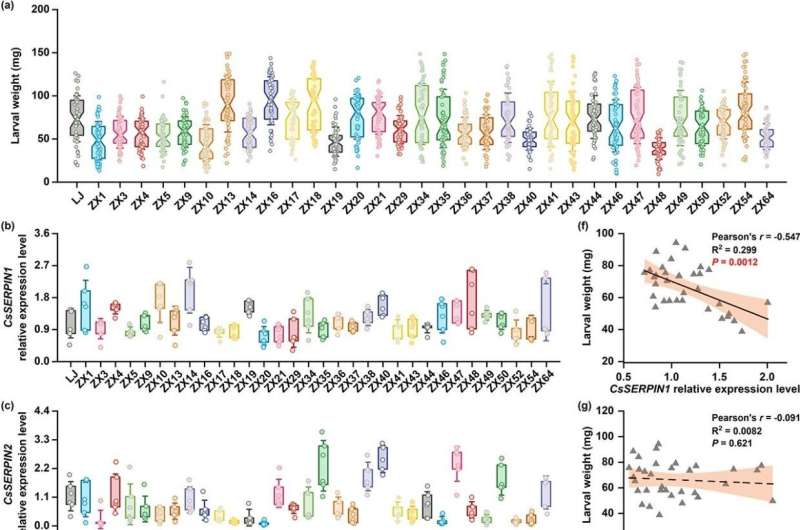This article has been reviewed according to Science X's editorial process and policies. Editors have highlighted the following attributes while ensuring the content's credibility:
fact-checked
trusted source
proofread
Unlocking the potential of protease inhibitors for enhanced pest resistance in tea plants

Protease inhibitors are a promising strategy for enhancing herbivore resistance in plants, which is crucial for addressing the significant yield losses in crops such as tea plants due to insect herbivores. Serine protease inhibitors (SERPIN) are one of the largest superfamilies of protease inhibitors in plants and play a key role in defense against herbivores.
Despite the advances in SERPINs that have been well-studied in many crop plants, the specific impact and molecular mechanisms of SERPINs in tea plants remain unclear.
Horticulture Research published research titled "A constitutive serine protease inhibitor suppresses herbivore performance in tea (Camellia sinensis)." This study suggests that CsSERPIN1 can inactivate gut digestive proteases and suppress the growth and development of herbivores, making it a promising candidate for pest prevention in agriculture.
In this study, the research team aimed to explore the role of serine protease inhibitors in defending tea plants against herbivorous pests. Initially, researchers conducted a thorough screening of tea plant accessions to assess their resistance to the tea geometrid, a major pest.
This involved identifying and analyzing the expression patterns of four SERPIN genes from the tea genome, focusing on their structure and homology to known SERPINs in other plant species. Among these, CsSERPIN1 is noteworthy for its negative correlation with herbivore growth, indicating a potential role in pest resistance.
Further investigation into CsSERPIN1 revealed that it is a constitutively expressed gene with stable expression levels across various biotic and abiotic stress conditions. The functionality of CsSERPIN1 as a protease inhibitor was then tested through in vitro experiments, where it demonstrated significant inhibitory effects on the digestive proteases trypsin and chymotrypsin.
These findings were corroborated by in vivo assays, showing that larvae fed on diets containing CsSERPIN1 had reduced growth and protease activity. The defensive capabilities of CsSERPIN1 were also investigated by transiently overexpressing it in tea plants and heterologously expressing it in Arabidopsis. Both experiments resulted in decreased herbivory by the tea geometrid and fall armyworm, respectively.
In conclusion, this research highlights the role of CsSERPIN1 as a novel, constitutively expressed serine protease inhibitor that effectively reduces herbivore growth and development without adversely affecting the host plant's growth. By demonstrating CsSERPIN1's broad-spectrum activity against various herbivores and its stable expression unaffected by environmental factors, the study suggests CsSERPIN1 is a promising candidate for developing pest-resistant tea plant varieties.
The implications of this research extend beyond tea agriculture, offering insights into the potential of constitutive protease inhibitors as a durable and eco-friendly solution for crop protection.
More information: Meng Ye et al, A constitutive serine protease inhibitor suppresses herbivore performance in tea (Camellia sinensis), Horticulture Research (2023). DOI: 10.1093/hr/uhad178
Provided by NanJing Agricultural University




















